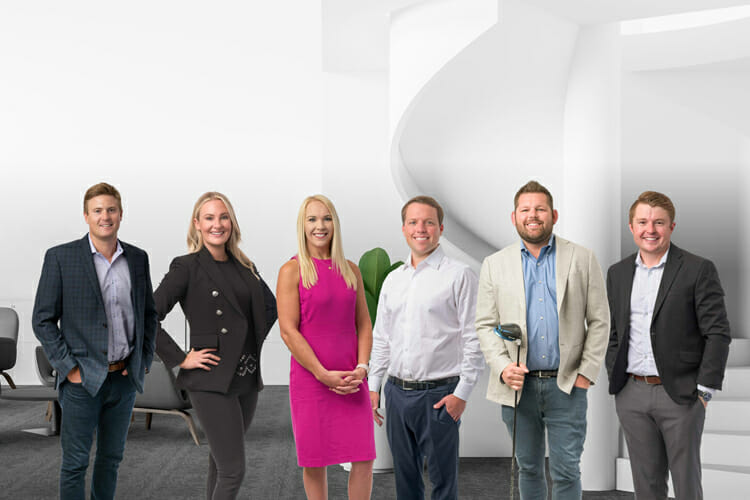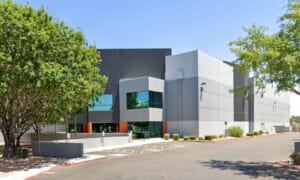It’s a unique time for newer generations of commercial real estate (CRE) professionals in Arizona. Coming off the heels of a global pandemic, inflation upheaval, supply chain issues and labor shortages, rising leaders who are part of the NAIOP Developing Leaders program have been presented with unusual and unprecedented challenges. Alongside these obstacles, however, are also a wealth of opportunities. The widespread growth of Metro Phoenix has created ample and exciting career-building circumstances.
To get a glimpse of what it’s like for CRE up-and-comers as they navigate today’s equally erratic and opportunistic territory, AZRE sat down with seven young and hungry industry leaders, who are also members of the NAIOP Developing Leaders program, which is geared specifically toward professionals age 35 and under.
READ ALSO: Here are the Best of NAIOP winners for 2022
READ ALSO: NAIOP Arizona named 2022 Large Chapter of the Year
AZRE: Why did you choose CRE as a career field?
Chris Beall, senior associate, JLL Phoenix: Being from Phoenix, I knew a lot of successful people in the industry, family included. But after graduating from college I hadn’t thought a lot about what I was going to do. I was playing baseball and thought that’s what I wanted to do. Reality sunk in, however, and I knew I had to get a job. I was fortunate to know — and talk to — enough people to know what this business is and those people were all really fantastic individuals who made it easy for me to get into real estate.
Alex Boles, director of investment and development at ViaWest Group: My grandfather was a developer, and I was always attracted to his lifestyle and his excitement and fulfillment when he drove by a project and could say that he was a large part of it. As I got older, I found that real estate gave me a unique opportunity to make a living in development and that my passion for seeing buildings come up from a raw piece of land gives me the same excitement I once saw on my grandfather’s face.
Ellen Boles, commercial interior designer: Although my career goals never specifically involved commercial real estate, my interest in design ultimately led me to commercial interior architecture as the perfect platform to be both creative and technical. The dynamic nature of our industry and knowing that no two days would ever be the same is challenging and exciting.
Tim Colquhoun, corporate banking relationship manager with National Bank of Arizona: Being able to finance CRE all over the state provides a sense of visible, tangible accomplishment of your efforts. It’s really great to be able to support this thriving asset class in Arizona and be able to show others what you are a part of. The talented teams/masterminds you meet on one project alone provide incredible satisfaction in this career.
Phil Haenel, executive director at Cushman & Wakefield: My dad (Mike Haenel) was in commercial real estate and so I grew up around the industry and developed an interest in the business fairly early on in my childhood. When I was a sophomore in college at the University of Arizona, I worked as an intern at Ryan Companies in Phoenix where I had a great learning experience in construction/property management and development and worked with some really great and helpful professionals. This internship provided me with a good foundation and much deeper understanding of the industry, and I became even more intrigued by the business.
Chelsea Porter, executive vice president of business development at The Renaissance Companies: I grew up in the commercial real estate industry as my parents founded Renaissance Construction when I was about a year old. I had an interest at a young age; my father would come home with blueprints and give me little tasks such as counting doors and windows. As the years went by, he taught me more and eventually I was out at job sites. Naturally, I fell in love with it all and committed my career to leading the legacy he left behind.
Josh Tracy, vice president of real estate development at Ryan Companies: It was important for me to find an entrepreneurial environment to thrive in, as I followed in my parents’ footsteps of owning my own business. My passion for real estate investment started when I took my first real estate class at the W.P. Carey School of Business. From there, I knew that commercial real estate was what I wanted to pursue. I truly enjoy how real estate development presents daily challenges and opportunities to build long-lasting relationships with so many great people in the industry.
AZRE: Do you have a mentor?
CB: I have too many mentors to throw any names out there. I feel really blessed to have numerous people I’ve leaned on since I started in 2016. I would say I’ve really worked closely with eight different people during that time frame for advice or help. I remember getting into the business and being impressed by how many people were willing to help me.
EB: I’m fortunate to have been mentored by several great CRE leaders over the years, many of whom are now close friends. I’m especially thankful to Fred Messner for pushing me out of my comfort zone, helping me set goals and leading by example to learn from my mistakes. His genuine interest in helping young professionals grow and succeed has had an invaluable impact on my career.
TC: One of my strongest NAIOP mentors has been James Murphy (Willmeng) as well as several others in the finance world, and my father. These folks have provided insightful perspectives on building, development, transaction mechanics, etc., and ultimately the core belief that business is very personable and relationships are what create your success overall. Each of my mentors places most of their advice on maintaining great relationships.
PH: I have been fortunate to have many mentors in the business beginning in college and in starting my career right out of college. I was fortunate to start working for three exceptional brokers in Oakland who taught me a ton about the brokerage business and how hard work/persistence and doing the right thing is the key to the business. I also have three amazing mentors at Cushman & Wakefield in Phoenix (Mike Haenel, Andy Markham and Will Strong) who I learn a great deal from every day and on every deal.
CP: I have been blessed with many mentors over the years, however, the mentor who played the largest role in my life/career would be my father. He encouraged me to diversify my knowledge of commercial real estate so that I could best understand the industry from a holistic approach, as well as our client’s needs, which would ultimately best serve me and my career.
AZRE: How has COVID changed the way you work?
CB: Although it has certainly changed our industry, it hasn’t changed how I work personally a whole lot. I’ve been back in the office working full time since August 2020. I was home for about five months and then was back at it.
AB: COVID has taught me that I need to be around people and energy to work at a high level. It has allowed me to be more open-minded when prioritizing my teams’ time in the office, flexibility, accountability and accessibility.
TC: COVID certainly accelerated many technologies (file sharing platforms, web-based calls, etc.) and provided workforce flexibility that has improved transaction flow processes and connections with clients. Prior to the pandemic, getting on someone’s schedule was often challenging, but now most owners/developers are free for a 15-30 minute virtual call/huddle to discuss a project idea which has increased overall deal execution.
PH: Trying to find the right balance as a young professional as well as a recent dad has been a challenge for me, certainly more so during the pandemic. While working remote I am still productive and always remain in close contact with clients to service their needs. I really love being in the office and interacting personally with my team and colleagues. And being a relatively younger broker, it’s also an easier and important way for me to learn and engage with others, including my mentors, through personal interaction and collaboration in an office environment — whether it’s talking deals or discussing market trends or brainstorming client ideas and solutions.
CP: COVID forced our team and industry to think outside of the box for business development as we were used to going to office meetings, coffee and lunch meetings, events and conferences. Although this was uncomfortable at first, I learned a valuable lesson about setting my team up for success and ultimately prioritizing my time in a strategic manner. I realized constantly being out and about did not have as much of an ROI as other strategies used in the past.
JT: The pandemic has certainly brought its challenges, but it also has also given us an opportunity to rethink our best practices for conducting business. First and foremost, I would say communication has been paramount for my team and myself. As the industry and market are evolving, it remains more important now than ever that we are communicating efficiently, whether it is in the office, or jumping on a quick call, virtual or the old-fashioned way.
AZRE: What are the biggest challenges you are facing in today’s market?
CB: For the office side of things, challenges that we’re facing are the work-from-home versus work-from-work dilemma that companies are facing — either influencing or prohibiting a decision when it comes to their office needs has been a significant challenge. Increased construction costs make our jobs that much harder when it comes to building out space and putting together a deal, and timing has been an issue as well.
AB: Unknowns. Interest rates have created unknowns for lenders and equity partners, which has created unknowns in deal pursuit and underwriting, which all layer onto the supply-chain unknowns we’ve been battling for the last couple years. This is making decision-making quite difficult.
TC: Economic uncertainty. Unfortunately, with rising rates, inflation and political volatility I believe this is creating apprehension for folks to start — or undertake — certain projects until some of the uncertainty shakes out. With CRE, completed buildings require tenants, end users and employees. If companies and tenants are concerned about the overall market, new construction could face some pressure.
PH: One challenge we have been facing on the industrial tenant representation side is the limited supply of available space for these tenants, which include logistics, e-commerce, and others across the industry, and the flurry of tenants looking for space in the Phoenix market.
CP: Over the past year and a half,
it has been maintaining and acquiring talent, material lead times and pricing. Our company continuously meets to discuss challenges, areas of opportunities and solutions; we want to be as proactive as possible. We work together to find long-term solutions and have found that some can be quickly implemented while others such as our recruitment and retention strategy was a full overhaul.
JT: One of the biggest challenges we are facing is rising construction costs, which includes the increase in prices for steel, wood and general materials. In addition, the rising interest rate environment puts pressure on construction debt and exit pricing. And the current topics of inflation, talks of a possible recession and supply chain issues can all affect industry sentiment, so I am always keeping a close eye on those issues.
AZRE: What advice would you give to a young professional looking to get started in CRE?
CB: Don’t be afraid to ask for advice. Always call everyone back and don’t ever not get back to someone.
AB: Understand your own strengths and weaknesses, then work to get better at both. Own every cell, sentence, paragraph, negotiation or lesson and then pursue the type of real estate that fits you. Once you’ve identified the role then work relentlessly to create value.
EB: Get involved and don’t be afraid to ask questions. Take advantage of the more intimate networking opportunities — you’ll meet more people and develop meaningful relationships with peers and industry leaders. Find a great mentor!
TC: Get involved in trade groups that are set up to help you as a young professional — ULI and NAIOP, as examples. These organizations are incredible resources that will help you expand your network and get to know other professionals. Get a mentor quickly and invest in that mentor — make the time for coffee with them and read the books they recommend.
PH: The key to this business is being hardworking and maintaining a great, positive attitude — no matter the challenges and circumstances. I would also advise others to be proactive, network and become involved with great organizations such as NAIOP (find a way to be a part of the NAIOP Developing Leader Steering Committee).
CP: Listen; be a sponge and never stop seeking knowledge of the CRE industry. Decide what your brand is, own it and sell it. Stay humble — it’s a team effort to make a development come to fruition. And, “faith, family, company.” This is a key piece of advice someone in the industry shared with me shortly after my dad’s passing. It is very important to keep these priorities in order when working with family.
JT: I would tell any young professional to not be afraid of getting involved, seek out advice from your peers and think ahead to what’s next.
AZRE: How has NAIOP helped advance your career?
CB: NAIOP has been huge for me. It’s probably one of the best ways to meet people in the trade. You get to meet and be exposed not only to peers but to mentors and leaders in the industry. It has been very good for me personally to be a part of it. And there are ways to give back to NAIOP as well.
EB: As young professionals, my husband and I relocated across the country to Phoenix, where we knew no one personally or professionally. Fortunately, my new boss (and future mentor) Fred Messner, encouraged me to join NAIOP Developing Leaders which provided me the opportunity to meet and work with some of the most influential CRE industry leaders.
TC: NAIOP has provided me with a network I wouldn’t have been able to build otherwise. I have called on this network many times for charitable functions, business transactions and more. It starts as a network of people, who then become friends. Being a member of NAIOP has also created credibility when calling on prospects and clients which is really important in this market.
CP: Upon entering the CRE industry, the first words of advice I consistently received were to get involved with NAIOP. My first few events were a developing leader’s mixer, an educational breakfast and Best of NAIOP. I immediately recognized the ROI with the level of talent and variety of people I was introduced to, as well as the knowledge I was gaining.
JT: Joining NAIOP has had a huge impact on me, personally and professionally. NAIOP has provided me with a great platform of networking opportunities and educational events, where I can meet industry leaders and have the chance to learn something new to improve my skill set.




